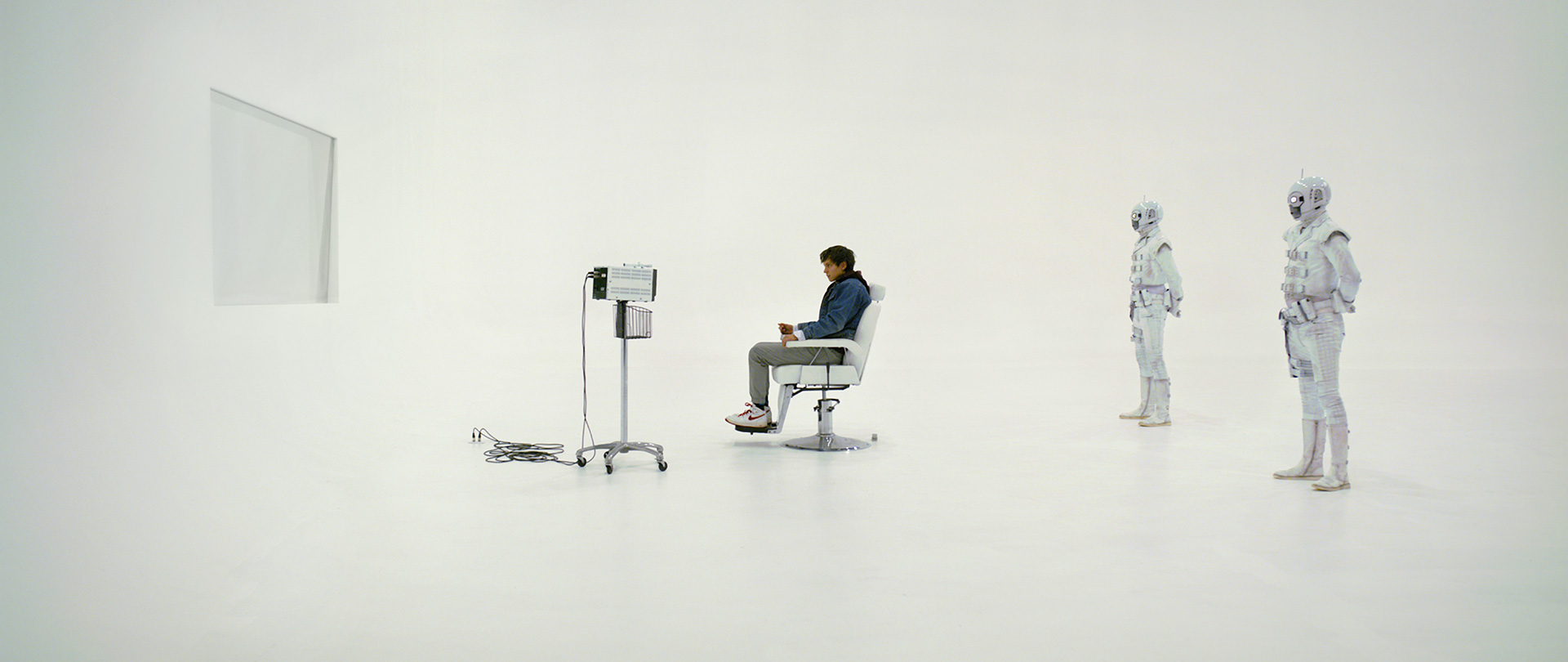There’s a lot left unsaid within visual effects artist Eric Demeusy’s directorial debut Proximity. While initially thinking it was a means to create mystery around its main character Isaac (Ryan Masson), I eventually saw it was a product of needing narrative context for what’s actually important instead. This isn’t necessarily a bad thing if you hide those loose threads in the background as the main thrust of your action is born from them, but doing so proves difficult when they’re specifically introduced as that thrust. Example: an early therapy session alluding to lost family, survivor’s guilt, and depression. Here’s a scene that holds weight by setting up a backstory for Isaac beyond his job at NASA. It supplies humanity and empathy by creating a base of emotional purpose.
I was personally drawn in because of these clues. What left Isaac in a position to heal physically despite his continuing attempts to pick up the pieces psychologically? What might he unlock by taking his doctor’s suggestion of starting a video diary to hopefully provide him an outlet to speak aloud without needing to burden the co-workers he substitutes as friends? Pair this unknown history with a prologue that depicts the alien abduction of a lumberjack in Alaska forty years prior and I couldn’t help but wonder how they connected. That’s what Demeusy sets up whether he knows it or not: a connection spanning time and place that reaches further than mere coincidence. So I of course found myself extremely disappointed upon discovering their bond was fully superficial.
Isaac’s family is never mentioned again. The therapy? It’s simply a reason to ensure his camera is filming upon encountering an alien while out on a hike near where a meteor falls. The camcorder itself is forgotten too besides as the device housing his controversial footage. When Isaac inevitably goes on the run from a shadowy government organization with an android police force (led by Shaw Jones’ Agent Graves), he doesn’t bring the device to capture the chaos in a bid for consistency. It served its purpose and now watches as the adventure’s propulsion takes a sharp tonal turn alongside us. What began as a quiet, contemplative journey of self-discovery on behalf of an introvert suddenly becomes a suspense thriller with conveniently sourced allies and inept villains.
It’s too bad since that first half is genuinely intriguing. Isaac has NASA satellites at his disposal, a radio transmission without a discernable origin point, and the courage to put his extraterrestrial encounter online. Demeusy therefore sets up the resources for his lead to figure out what’s happening while also allowing the world to react to the implausibility of what we know is real. Isaac becomes a viral sensation as the media seeks to poke holes in his story. The potential to go down a narrative road pitting belief versus proof arrives just as he finds someone with a similar experience (Highdee Kuan’s Sara) to bolster his ambitions to continue moving forward no matter how many people label him a hoax. The truth is too important to quit.
This motivation changes the moment Graves enters the fray. Faith is no longer an option as fact trumps all to the point where only one character stands by Isaac the rest of the way without having also seen aliens—and his (Christian Prentice’s Zed) doing so is less about what his new comrade says and more about wanting to escape his inexplicable tree-house bunker with encrypted wifi deep in the heart of Central America. The entire mission to find out why the aliens are here gets hijacked for a cat and mouse chase between supposedly smart people who either slow walk the fact they know where their targets are or forget that turning trackers off at your final destination ensures your pursuers know your final destination.
I hate pointing out details like that because I accept the need for suspension of disbelief, but they’re tough to ignore when little else is going on. I almost forced myself to do so by treating the whole like a kid’s film, but it never quite fully embraces that option. The sound effects, score, and dialogue are each heightened to mimic nostalgic family adventure fare of the 80s and 90s, but there are no children. Isaac isn’t some precocious teen. He’s a literal rocket scientist working for the Jet Propulsion Laboratory. So much of my skepticism and desire for more might have been rectified if Demeusy had skewed younger, though. Erase those looming questions about Isaac’s past and make it so Graves’ blunders are because he underestimates him.
Make the aforementioned lumberjack (Don Scribner’s Carl) a relative or family friend rather than some other guy who also saw aliens and bring things full circle to satisfy the arc of the person we’re supposed to be pulling for most: Isaac. Don’t shoehorn in a last-second, one-line backstory for Graves’ vitriol against Carl. Don’t introduce unexplainable powers in a way that makes them seem innocuous before forgetting about them until the exact moment their full breadth of wonders can be honed without any practice or experimentation first. These things need room to breathe. They demand the time to be more than enigmatic and pretty (Demeusy’s visual artistry has Proximity‘s budget looking much higher than it surely is). The script is sadly too shallow to bring everything together.
Proximity hits VOD and Digital HD from Shout! Factory on May 15.

